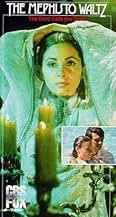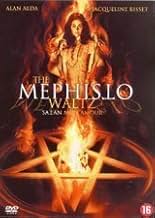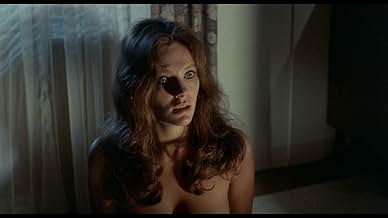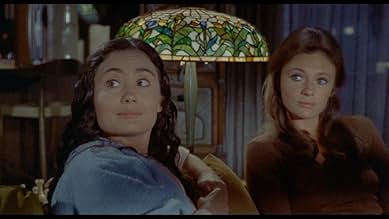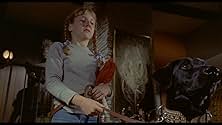CALIFICACIÓN DE IMDb
6.1/10
3.5 k
TU CALIFICACIÓN
Un viejo satanista moribundo se las arregla para transferir su alma al cuerpo de un joven concertista de piano.Un viejo satanista moribundo se las arregla para transferir su alma al cuerpo de un joven concertista de piano.Un viejo satanista moribundo se las arregla para transferir su alma al cuerpo de un joven concertista de piano.
- Dirección
- Guionistas
- Elenco
- Premios
- 1 nominación en total
Bradford Dillman
- Bill Delancey
- (as Brad Dillman)
Curd Jürgens
- Duncan Ely
- (as Curt Jurgens)
Berry Kroeger
- Raymont
- (as Barry Kroeger)
Terrence Scammell
- Richard
- (as Terence Scammell)
Leon Alton
- Pallbearer
- (sin créditos)
Antoinette Bower
- Member of Ely's Group
- (sin créditos)
- Dirección
- Guionistas
- Todo el elenco y el equipo
- Producción, taquilla y más en IMDbPro
Opiniones destacadas
Too bad this neglected horror film got lost in the wake of the similarly themed Rosemany's Baby. Modestly successful journalist Alan Alda suddenly becomes a successful concert pianist following a chance meeting with piano virtuoso Duncan Ely (Curt Jergens) and his darkly seductive daughter, Roxanne (Barbara Parkins). His growing involvement with the wealthy family and their strange friends eventually comes between Alda and his loving wife, Paula (Jackie Bissett). As sinister events unravel, Paula is drawn deeper into a web of diabolic happenings until the threads come together in a surprising and oddly gratifying climax.
The script is tight and well-thought out, with the exception of Dillman's role as Roxanne's ex-husband. After all, if the diabolists are so sexually compelling, how could he divorce her. And though director Paul Wendkos occasionally goes overboard with the camera tricks, the scenes are stylishly done, especially the banquet with its snatches of pretentious banter, and the New Years party with its erotic grotesqueries bound to end in an orgy. And underneath it all lies an undercurrent of evil, even during the brightest splashes of sunlight.
Though Alda gets star billing, it's actually Bissett's movie, which she carries off in finely shaded fashion. Her scenes with the ominously silent Roxanne (just count Parkins' few lines) amount to an exquisite model of civilized contempt, minus the fisticuffs. Alda too, shines, as he acts out Ely's imperious manner at just the right moments, proving in those pre-MASH days that he was more than the humorously caustic Hawkeye Pierce.
As good as the movie is, I can't help wondering if it might have been even better had the mystery not been exposed as early as it is. Suppose the script had skipped the transference ritual and simply had Alda take on Ely's characteristics without explanation, such that the audience would have to ponder what's going on, instead of having it handed to them. There may have been good reasons for not taking this mystery route, but at least it's worth considering.
Still and all, Waltz remains a fine example of movie horror done in both color and sunny surroundings, and with a lot of style and conviction. Too bad, it's slipped into movieland's version of yester-year oblivion. It deserves better. And, if nothing else, the script raises the scary question of whether dogs really are man's (woman's) best friend.
The script is tight and well-thought out, with the exception of Dillman's role as Roxanne's ex-husband. After all, if the diabolists are so sexually compelling, how could he divorce her. And though director Paul Wendkos occasionally goes overboard with the camera tricks, the scenes are stylishly done, especially the banquet with its snatches of pretentious banter, and the New Years party with its erotic grotesqueries bound to end in an orgy. And underneath it all lies an undercurrent of evil, even during the brightest splashes of sunlight.
Though Alda gets star billing, it's actually Bissett's movie, which she carries off in finely shaded fashion. Her scenes with the ominously silent Roxanne (just count Parkins' few lines) amount to an exquisite model of civilized contempt, minus the fisticuffs. Alda too, shines, as he acts out Ely's imperious manner at just the right moments, proving in those pre-MASH days that he was more than the humorously caustic Hawkeye Pierce.
As good as the movie is, I can't help wondering if it might have been even better had the mystery not been exposed as early as it is. Suppose the script had skipped the transference ritual and simply had Alda take on Ely's characteristics without explanation, such that the audience would have to ponder what's going on, instead of having it handed to them. There may have been good reasons for not taking this mystery route, but at least it's worth considering.
Still and all, Waltz remains a fine example of movie horror done in both color and sunny surroundings, and with a lot of style and conviction. Too bad, it's slipped into movieland's version of yester-year oblivion. It deserves better. And, if nothing else, the script raises the scary question of whether dogs really are man's (woman's) best friend.
At least two people below comment on the frequent appearance of the boom mike in this film. To clarify, that is the fault of the TV company / Video company for screening the film in the wrong aspect ratio. It is not the fault of the filmmakers. If you saw this film in the cinema there would be no boom mike since the top of the frame would be masked off by the lens gate. The TV company is showing you the full frame of the picture which should not be all visible to the audience.
Whatever moral issues exist in this strange tale of the occult, they vanish as soon as you accept the premise of this story--that a woman would kill another to repossess her husband with both of them in the guise of someone else's body!! It's about as weird as any Tales from the Crypt!
On the plus side, all of it is stylishly photographed and played with a certain amount of relish, at least by Jacqueline Bisset, Curt Jurgens and Bradford Dillman. Biggest flaw is casting Alan Alda in the central role as the pianist who inherits the musical talent of Curt Jurgens when the Satanist dies, bequeathing Alda with his body and soul. Bisset is the wife who slowly comes to suspect that her husband has been taken over by someone else.
Not quite as strikingly original as "Rosemary's Baby", it does have some effective horror moments, notably involving scenes with a rather ferocious black dog and a scene where the Devil is summoned but we never actually see him. Imagination is given free reign here (at least fleetingly), shades of Val Lewton. Perhaps a technique that should have been used more often throughout.
None of it quite makes sense and the ending is a distinct letdown, but there are some chilling moments nevertheless. Bisset and Parkins are beautifully photographed, with Bisset coming out ahead in the acting department, playing the stressed out wife with appropriate fear and tension. Parkins, on the other hand, seems to rely on one frozen expression, sleepwalking through her role, relying solely on her looks to get by in a way that Hedy Lamarr was often accused of doing in films of the '40s.
As for Alan Alda, he is much too bland, lending neither interest nor credibility to a role that demands a strong romantic lead. His career suggests that he is clearly more comfortable in character roles requiring comic flair, not straight dramatic parts. Bradford Dillman is at least a stronger presence in a lesser role.
All in all, not bad for watching when you're in the mood for a tale of the occult. I seem to recall enjoying the book years ago and the film doesn't quite measure up. It emerges as one of those films that could have been much more satisfying with better casting and direction.
On the plus side, all of it is stylishly photographed and played with a certain amount of relish, at least by Jacqueline Bisset, Curt Jurgens and Bradford Dillman. Biggest flaw is casting Alan Alda in the central role as the pianist who inherits the musical talent of Curt Jurgens when the Satanist dies, bequeathing Alda with his body and soul. Bisset is the wife who slowly comes to suspect that her husband has been taken over by someone else.
Not quite as strikingly original as "Rosemary's Baby", it does have some effective horror moments, notably involving scenes with a rather ferocious black dog and a scene where the Devil is summoned but we never actually see him. Imagination is given free reign here (at least fleetingly), shades of Val Lewton. Perhaps a technique that should have been used more often throughout.
None of it quite makes sense and the ending is a distinct letdown, but there are some chilling moments nevertheless. Bisset and Parkins are beautifully photographed, with Bisset coming out ahead in the acting department, playing the stressed out wife with appropriate fear and tension. Parkins, on the other hand, seems to rely on one frozen expression, sleepwalking through her role, relying solely on her looks to get by in a way that Hedy Lamarr was often accused of doing in films of the '40s.
As for Alan Alda, he is much too bland, lending neither interest nor credibility to a role that demands a strong romantic lead. His career suggests that he is clearly more comfortable in character roles requiring comic flair, not straight dramatic parts. Bradford Dillman is at least a stronger presence in a lesser role.
All in all, not bad for watching when you're in the mood for a tale of the occult. I seem to recall enjoying the book years ago and the film doesn't quite measure up. It emerges as one of those films that could have been much more satisfying with better casting and direction.
Very strongly reminiscent of Rosemary's Baby in substance and style, and why not? When did Hollywood not endear itself to cash-ins of other popular films? Jackie Bissett got to do two of them - this one and The Deep.
She's great in both. Everyone else is very good, but for Alan Alda, who is merely adequate. Funny, even Bradford Dillman is better here, but then Alda wasn't yet into his stride. This almost reeks of TV movie entrapments, it's a Quinn Martin production, but manages to overcome most of them with a fairly literate denouement.
There's the momentary lapse into trite dialog, and silliness, as exhibited by a trip to Mexico where entry into Mexico is announced by a painted billboard on a two-lane highway running past a park with water sprinklers going and with no border guards nor line of cars. Believe me, I went to Mexico in 1971 both from San Diego and inland Calexico, and there was no such sweetheart road of entry.
Well, watch it and you'll see what I mean. It's worth a view just for the great opening credits.
She's great in both. Everyone else is very good, but for Alan Alda, who is merely adequate. Funny, even Bradford Dillman is better here, but then Alda wasn't yet into his stride. This almost reeks of TV movie entrapments, it's a Quinn Martin production, but manages to overcome most of them with a fairly literate denouement.
There's the momentary lapse into trite dialog, and silliness, as exhibited by a trip to Mexico where entry into Mexico is announced by a painted billboard on a two-lane highway running past a park with water sprinklers going and with no border guards nor line of cars. Believe me, I went to Mexico in 1971 both from San Diego and inland Calexico, and there was no such sweetheart road of entry.
Well, watch it and you'll see what I mean. It's worth a view just for the great opening credits.
Quinn Martin Productions venture into theatrical films as opposed to its television work is a tidy little entry in the Satanic genre which the late 1960s and early 1970s were chock full of and it is sad that we do not see such films today.
The stunning beauty Barbara Parkins and the irrepressible Curt Jürgens steal the show and turn in performances that dwarf the rest of the cast. This is a low budget film and yet without all of today's special effects it is readily more thrilling and frightening than the typical horror film of contemporary American film.
Thank heavens it is on DVD I saw it originally and now eagerly seek to have it for my collection.
The stunning beauty Barbara Parkins and the irrepressible Curt Jürgens steal the show and turn in performances that dwarf the rest of the cast. This is a low budget film and yet without all of today's special effects it is readily more thrilling and frightening than the typical horror film of contemporary American film.
Thank heavens it is on DVD I saw it originally and now eagerly seek to have it for my collection.
¿Sabías que…?
- TriviaHas the singular distinction of being the only theatrical film produced by Twentieth Century-Fox during the entire calendar year of 1970, this due to financial reversals incurred by the studio when several of its recent films failed at the box office.
- ErroresAt various points during the film, the demonic potion bottle varies between a clear glass bottle partially filled with blue liquid and a blue glass bottle in which the liquid cannot be seen.
- Citas
Duncan Ely: People should be born at the age of 70 and live their life backwards.
- Versiones alternativasAn alternate cut of The Mephisto Waltz ran on the Flix network in the early-mid 2000s. This version includes two memorable differences: a much longer floor shot close up of the Doberman's head wearing the Halloween mask, and a shot of Satan's hooves when he visits Paula Clarkson (Jacqueline Bisset) during her Satanic ritual.
- ConexionesFeatured in Cinemacabre TV Trailers (1993)
Selecciones populares
Inicia sesión para calificar y agrega a la lista de videos para obtener recomendaciones personalizadas
- How long is The Mephisto Waltz?Con tecnología de Alexa
Detalles
- Fecha de lanzamiento
- País de origen
- Idiomas
- También se conoce como
- Círculo del terror
- Locaciones de filmación
- Avenue of the Stars, Century City, Los Ángeles, California, Estados Unidos(Paula Clarkson walking over bridge in Century City)
- Productora
- Ver más créditos de la compañía en IMDbPro
- Tiempo de ejecución1 hora 55 minutos
- Color
- Relación de aspecto
- 1.85 : 1
Contribuir a esta página
Sugiere una edición o agrega el contenido que falta




